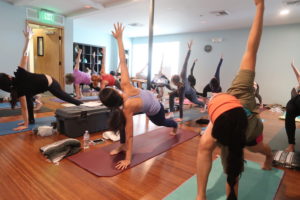Improve Response Inhibition with Yogic Breathing
By John M. de Castro, Ph.D.
“At its core YOGA is early study of human psychology. For me, to be curious about yoga is to be curious about yourself, and about other people…I’m curious about YOU! I’m interested in the way our community responds, and more importantly how we behave, IN REAL LIFE.” – Erica Mather
Mindfulness practices such as meditation, yoga, and tai chi/qigong have been shown to have a myriad of positive benefits for the practitioner and they have been shown to alter a large variety of cognitive (thought) processes, such as attentional ability, memory, verbal fluency, critical thinking, learning, analytic thinking, mathematical ability, higher level (meta-cognitive) thinking, and cognitive reappraisal. A very important cognitive ability for the control of behavior is response inhibition. This is the ability to restrain or withhold an inappropriate behavior when necessary. This ability is particularly underdeveloped in adolescents frequently resulting in impulsive behavior.
In today’s Research News article “Immediate effects of yoga breathing with intermittent breath holding on response inhibition among healthy volunteers.” (See summary below or view the full text of the study at: http://www.ijoy.org.in/article.asp?issn=0973-6131;year=2018;volume=11;issue=2;spage=99;epage=104;aulast=Saoji ), Saoji and colleagues examine the ability of yoga breathing practices to improve short-term response inhibition. Yoga practitioners between the ages of 18 – 25 years were recruited and participated in 8 weeks of breathing practice followed by baseline assessment. On separate days the participants engaged in either a 40-minute conditions of yoga breathing with intermittent breath holding or yoga breathing with breath awareness.
Yoga breathing with intermittent breath holding included the regulated yogic breathing for 20 min incorporating phases of inhalation, internal retention of breath, exhalation, and external retention of breath. Yoga breathing with breath awareness involved normal breathing while attending to the breath. At baseline and immediately after the breathing sessions they participated in a Go – No Go task where they pressed keys in response to stimuli unless a No Go signal was presented after the stimulus in which case they were to not respond; inhibit responding.
They found that after both the Yogic breathing with breath awareness condition and the Yogic breathing with intermittent breath holding condition the participants demonstrated significantly improved performance in the No Go condition but not the Go condition. This suggests that after either breathing sessions response inhibition was enhanced but not simple responding. This is an interesting result, but it does not demonstrate that the breathing condition was responsible as any attention task may have produced similar results. So, future work needs to include alternative attentional tasks not involving breathing. Nevertheless, the results suggest that short-term yogic breathing may be beneficial to the practitioner in improving their ability to withhold responses when appropriate.
So, improve response inhibition with yogic breathing.
“a growing number of scientific studies suggest that yoga may enhance students’ mind-body awareness, self-regulation, and physical fitness which may, in turn, promote improved behavior, mental state, health, and performance ” – Bethany Butzer
CMCS – Center for Mindfulness and Contemplative Studies
This and other Contemplative Studies posts are also available on Google+ https://plus.google.com/106784388191201299496/posts and on Twitter @MindfulResearch
Study Summary
Saoji AA, Raghavendra B R, Rajesh S K, Manjunath N K. Immediate effects of yoga breathing with intermittent breath holding on response inhibition among healthy volunteers. Int J Yoga 2018;11:99-104
Abstract
Background: There is very little evidence available on the effects of yoga-based breathing practices on response inhibition. The current study used stop-signal paradigm to assess the effects of yoga breathing with intermittent breath holding (YBH) on response inhibition among healthy volunteers. Materials and Methods: Thirty-six healthy volunteers (17 males + 19 females), with mean age of 20.31 ± 3.48 years from a university, were recruited in a within-subject repeated measures (RM) design. The recordings for stop signal task were performed on three different days for baseline, post-YBH, and post yogic breath awareness (YBA) sessions. Stop-signal reaction time (SSRT), mean reaction time to go stimuli (go RT), and the probability of responding on-stop signal trials (p [r/s]) were analyzed for 36 volunteers using RM analysis of variance. Results: SSRT reduced significantly in both YBH (218.33 ± 38.38) and YBA (213.15 ± 37.29) groups when compared to baseline (231.98 ± 29.54). No significant changes were observed in go RT and p (r/s). Further, the changes in SSRT were not significantly different among YBH and YBA groups. Conclusion: Both YBH and YBA groups were found to enhance response inhibition in the stop-signal paradigm. YBH could be further evaluated in clinical settings for conditions where response inhibition is altered.
